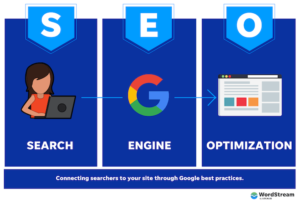Search Engine Optimization (SEO) is an essential part of a business’s marketing strategy. It increases the visibility of website content and leads to more online sales.
SEO involves a lot of work. It includes technical aspects like speed and coding as well as content strategy like keywords, meta descriptions and internal links. Click https://www.rankboss.com/ to learn more.

The goal of on-page optimization is to create web pages that are relevant and provide a great user experience. This is done by ensuring that the content of a page includes targeted keywords while also providing value to users. In the past, this was often done by “keyword stuffing”, where keywords were repeated in content unnaturally. Today, on-page optimization is about smart keyword targeting that avoids overdoing it.
Title tags and meta descriptions are important on-page SEO factors that influence search engine rankings. These are the first things a user sees when they conduct a search, so they are important to get right. They should be short, descriptive, and include the keywords that are being targeted on that page.
In addition, the content on a website should be readable. This includes using paragraph breaks, short sentences, and using scannable text. Most people access websites on mobile devices, so it’s critical that web pages are optimized for these platforms as well.
Another on-page SEO factor is a site’s URL structure. Including a keyword in the URL can help search engines understand the purpose and intent of a page better. It can also be helpful to have a consistent URL structure throughout an entire website. This can be accomplished by using 301 redirects where necessary.
On-page optimization also includes optimizing images for SEO. This involves adding alt text, using file names that include keywords, and incorporating keywords in the image title. Having a mobile-friendly website is also a big ranking factor. This is because Google places a lot of importance on user experience. A slow, clunky website will negatively impact user experience and may lead to a high bounce rate, which can hurt SEO performance.
Other on-page optimization factors include internal linking, click depth, and a website’s overall structure. For example, a site’s navigation should be easy to use and should have clear links between the different pages of a website. This makes it easier for search engines to crawl the site and index the content. It’s also a good idea to have a clear sitemap that shows the relationship between pages.
Off-Page Optimization
Off-page SEO is all about promoting your website content and brand on external platforms to drive more organic traffic, improve online visibility, build credibility and enhance your overall web presence. While off-page strategies can be time consuming and difficult to measure, they can also deliver powerful results that improve your search engine rankings over the long term.
One of the most effective off-page SEO tactics involves building quality backlinks from relevant websites to your own. These links pass authority from the source site to yours (known as “link juice”), which helps your website gain higher rankings in search engine results pages (SERPs). But not all backlinks are created equal: you’ll want to focus on securing high-quality links from authoritative websites in your industry.
Social media marketing is another essential off-page SEO strategy. Creating shareable content and promoting it on social media allows you to reach a wider audience and generate more organic traffic to your site. Plus, it can help boost your off-page SEO efforts by establishing you as a trusted and authoritative voice in your industry.
You can also use social media to promote your content and gain valuable backlinks by collaborating with influencers in your niche. Whether it’s guest blogging on other websites, pitching to be a podcast guest or asking customers for reviews, this type of off-page optimization is crucial for achieving your off-page SEO goals.
Other off-page SEO tactics include using original research to find high-quality and relevant keywords to target in your content, using local search engine optimization (SEO) tactics to optimize your Google Business Profile (GBP) and leveraging public relations to earn editorially given links. For example, by partnering with an influential blogger in your niche, you can leverage their following to gain exposure and attract new visitors to your website.
It’s important to treat off-page SEO campaigns like any other marketing initiative in order to maximize their effectiveness. By developing a clear plan and setting measurable and aligned goals, you can achieve more sustainable results and drive more organic growth over the long term. This approach can also help prevent off-page SEO tactics from being misused or abused by competitors and harming your search engine rankings.
Link Building
There are dozens of factors that go into a website’s search engine rankings, from quality content to mobile-responsive design. But one tactic that’s often overlooked is link building. And it can be a powerful way to improve your site’s visibility and boost its authority.
But what is link building exactly? It’s the process of acquiring one-way links to your website from other websites. This increases the number of “votes” your page receives from search engines, which can help it rise to the top of the results pages. There are many ways to build links, including guest blogging, social media marketing, content marketing, broken link building, and public relations. But no matter which strategy you choose, it’s important to focus on building high-quality links from reputable sources.
Back in the pre-Google days, search engines like Yahoo and Alta Vista ranked their results 100% based on the content of each webpage. Then Google came along and introduced their famous PageRank algorithm, which weighed the importance of a page by looking at the number and quality of the sites linking to it. This created a more holistic approach to ranking webpages, and it’s something that’s still used today.
While there are some shortcuts to getting links, such as buying them or using questionable techniques (also known as black-hat SEO), these can actually harm your search engine rankings in the long run. Plus, if you get caught, you could be hit with a manual penalty that can have devastating consequences for your website.
The best way to approach link building is to create a list of potential sites and blogs that you’d like to reach out to. Find out what type of content they publish, who their audience is, and what kinds of links they have on their pages. Then, find out if there are any opportunities to work together to get your content in front of their audiences.
When reaching out to potential partners, start by sending a personalized email with value. Avoid the spammy tactics of asking for a link, and instead focus on offering to write a guest post or provide them with some other type of valuable information. This will ensure that your email doesn’t end up in the trash and will be more likely to lead to a positive response.
Keyword Research
Keyword research is one of the most important aspects of SEO. It helps you determine which search terms are relevant to your business and how much traffic they could bring to your site. It also helps you optimize your website content for those keywords, which increases your visibility in search engines and drives organic traffic.
There are a number of ways to conduct keyword research, including using tools like Moz’s Keyword Explorer and SEMrush. These tools provide useful metrics, such as monthly search volume (MSV), average cost per click (CPC), and competition level, to help you make informed decisions about which keywords to target.
However, it’s important to remember that not all keywords are created equal. For example, “paranormal investigators” might have a higher MSV than “cat detective agency,” but it’s likely that you would get more traffic ranking for the latter term because it is more specific and targeted. Therefore, you should focus on finding and targeting keywords that have relevance to your business and are worth the effort it takes to rank for them.
Moreover, it’s also critical to understand search intent when conducting keyword research. Understanding search intent is essential to SEO because it helps you identify the needs of your audience and create relevant, effective website content. This includes determining whether the search intent is informational (searching for answers to questions), navigational (searching for a page on your website that matches their query), transactional (searching for products or services), or brand-related (searching for a company or product).
Another important aspect of keyword research is assessing how difficult it will be to rank for each term. This is determined by the number of websites competing for that keyword, and it’s important to consider the time, money, and resources it will take to rank for a particular keyword. It’s also important to note that the competitiveness of a keyword may change over time, so it’s essential to monitor its competitiveness on an ongoing basis. In this way, you can keep your SEO strategy fresh and up-to-date. Search language shifts constantly, and your audience’s needs and interests evolve over time, so keyword research is a never-ending process.

